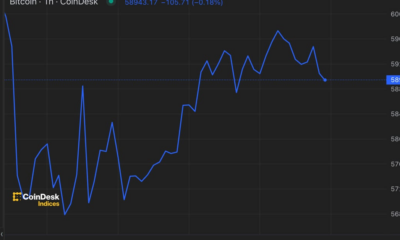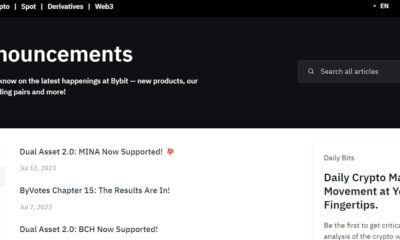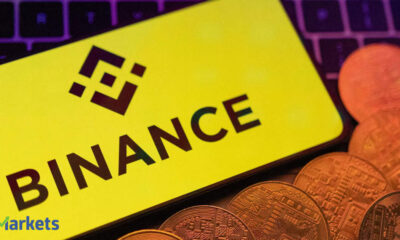News
The US House is preparing to vote on the first stand-alone cryptocurrency market structure bill

The US House of Representatives is poised to vote in favor of a cryptocurrency market structure bill for the first time, in a symbolic effort to fundamentally reshape the country’s digital asset regulatory landscape.
The Financial Innovation and Technology for the 21st Century Act, sponsored by members of the House Financial Services and House Agriculture committees, will begin seeing votes Wednesday afternoon, where it is expected to pass with a bipartisan majority.
The bill, called FIT21, would grant the Commodity Futures Trading Commission (CFTC) greater spot market authority over digital assets considered commodities, while creating new jurisdictional lines for the Securities and Exchange Commission (SEC). Crypto firms and issuers of digital assets would have a framework for determining whether and how their assets are securities under the terms defined by the bill, which in turn would allow them to know who their lead regulator might be.
Rep. Patrick McHenry (R-N.C.), who chairs the Financial Services Committee, told reporters Tuesday that he hopes for “a substantive vote” in favor of the legislation to demonstrate that there is real momentum for digital assets legislation , one week later. after the Senate voted in favor of a House resolution that overturned the SEC’s accounting guidelines.
The bill is expected to pass, with a handful of Democrats joining the majority of Republicans in voting for the bill. The bill’s path through the Senate is less clear, and the White House said Wednesday that it opposes the legislation, even as President Joe Biden he did not threaten a veto.
The bill has been the subject of numerous discussions in recent days.
Rep. Jim Himes (D-Conn.), one of the at least nine Democratic lawmakers who said they would support the bill said, “Look[ed] I look forward to working with my colleagues on the Financial Services Committee on our continued oversight of this issue.”
“FIT21 represents a major step forward in the regulation of the cryptocurrency industry and a significant improvement over the status quo,” he said in a statement.
Rep. Ro Khanna (D-California) announced will vote in favor of the bill shortly before Wednesday’s vote, saying “we need blockchain innovation here in America.”
Rep. French Hill (R-Ark.) told reporters Tuesday that the bill creates a “5-step test for whether something is a decentralized blockchain or not” and includes a roadmap the regulator can use.
In comments to the House Rules Committee, he said the lawmakers who developed the bill worked with regulators – including the SEC – for more than a year, incorporating their feedback into the legislation.
“We have included provisions to mitigate conflicts of interest. We impose capital and other necessary requirements on intermediaries. And we impose higher standards for custody,” he said.
There is also an interim process, under which companies must submit a “notice of intent to register” to agencies, he said.
Opposition to the bill, however, begins within the House Financial Services Committee itself.
Rep. Maxine Waters (D-California), the committee’s ranking member, called the bill “not fit for purpose” and told the House Rules Committee on Tuesday that “it is perhaps the worst deregulation proposal and more harmful than I have ever seen.” seen for a long time”, comparing it to the Commodity Futures Modernization Act. The CFMA, Waters charged, deregulated certain derivative products that later “blew up our economy when… AIG collapsed.”
FIT21 does not give the CFTC more authority to crack down on fraud or other crimes, despite placing the agency in charge of overseeing digital commodities, he said. The bill also eliminates disclosure requirements after 180 days, meaning the regulator cannot force companies it is supposed to regulate to provide audited financial statements beyond that deadline.
“What is even more problematic is the bill’s definition of listing ‘contractual investment assets,’” he said. “Securities that meet this definition would be moved into a regulatory vacuum, with no primary regulator and virtually no laws and regulations to speak of. Importantly, the investment contract’s definition of assets is not limited to cryptocurrencies, and it would be quite easy for both crypto and traditional securities must be formatted to meet this definition.”
A group of unions, consumer protection organizations, academics and others were sent a public letter to House Speaker Michael Johnson (R-La.) and Minority Leader Hakeem Jeffries (DN.Y.), asking them to vote against the bill and presenting a list of concerns similar to Gensler’s.
The letter took aim at the industry more broadly, stating that cryptocurrencies “still struggle to demonstrate viable use cases outside of speculative investing” and referencing various ongoing bankruptcies and civil and criminal litigation.
“The sector has recovered superficially this year, in part due to the controversial approval of BTC spot ETPs by the Securities Exchange Commission,” the letter reads. “However, the scams, hacks, thefts, instability, reckless promotional activities and regulatory evasion present during the last cryptocurrency bull market remain endemic to the industry today.”
The letter was signed by organizations including the AFL-CIO, Americans for Financial Reform, Revolving Door Project, National Consumer Law Center, and more than 30 other people and 10 individuals.
Echoing Gensler, the groups said they were concerned that the bill would weaken existing securities laws to the point that even non-crypto companies could “evade stricter oversight” by tying themselves to a decentralized network (or at least claiming to be linked to a decentralized network). net). While the bill gives more authority to the CFTC, the letter says that authority “is vague,” so much so that it could weaken other agencies like the Consumer Financial Protection Bureau.
“All in all, we believe that this bill, as written, introduces a political ‘cure’ that would be far worse than the disease and would create significant harm within and well beyond the cryptocurrency industry,” the letter reads.
Supporters of the bill argue that the legislation is needed to support companies’ efforts to “build a better financial services system and a better internet.”
“Since the birth of the Bitcoin network in 2009, the blockchain and digital asset industry has existed without targeted market regulation,” a letter submitted by the Blockchain Association, a lobbying group, he said. “The absence of clear rules creates confusion in the marketplace for companies and leaves users and consumers without protection.”
The letter, signed by groups including stablecoin issuer Circle, Ethereum incubator ConsenSys, venture capital firm Digital Currency Group, exchanges such as Kraken and 50 other industry companies, goes on to argue that the “lack of clarity” risks leaving the United States behind. in the “global technology race”.
SEC Chairman Gary Gensler published it a declaration he opposed the legislation on Wednesday. In it, he raised the specter of various cryptocurrency crashes and frauds, suggesting that the bill could allow even traditional pump and dumpers or penny stock dealers to escape oversight by branding themselves as users of decentralized networks.
“We should make the political choice to protect the investing public instead of facilitating the business models of non-compliant companies,” he said.
News
Ether Drops Further After ETF Launch

Key points
- Spot ether ETFs began trading in the U.S. today, with the funds initially having more than $10 billion in collective assets under management.
- Analysts expect the launch of spot ether ETFs to have a net negative impact on the underlying price of ether in the near term, due to expected outflows from the pre-existing Grayscale Ethereum Trust.
- Spot Bitcoin ETFs continue to see strong inflows, with BlackRock’s IBIT alone seeing more than $500 million in inflows on Monday.
- Franklin Templeton, a spot ETF issuer on bitcoin and ether, has invested in a project that intends to bring Ethereum technology to Bitcoin.
Nine-point ether exchange-traded funds (ETFs)) started trading on the stock market on Tuesday, but all the optimism ahead of their approval did not translate into gains for the cryptocurrency markets.
Ether (ETH), the native cryptocurrency of the Ethereum blockchain, dropped less than 1% around the $3,400 level as of 1:30 PM ET, while Bitcoin (BTC) fell more than 2% to around $66,000.
Ether ETFs’ Debut Isn’t as Flashy as Bitcoin ETFs’
Spot ether ETFs began trading at just over $10 billion assets under management (AUM)), according to Bloomberg Intelligence analyst James Seyffart, most of that money is in the current Grayscale Ethereum Trust (ETHE) which has now been converted into an ETF.
“In the long term, Grayscale will simultaneously have the highest and lowest fees in the market. The asset manager’s decision to keep its ETHE fee at 2.5% could lead to outflows from the fund,” Kaiko Research said in a note on Monday.
Outflows from ETHE, if they occur, would be similar to those faced by Grayscale’s Bitcoin Trust (GBTC) after spot bitcoin ETFs began trading in January of this year, most likely due to high fees for the two original funds. Grayscale’s existing fund charges 2.5% fees, while a new “mini” ether ETF will charge 0.15% and commissions for other ETFs are set at 0.25% or less.
Such outflows could impact the price of ether and market sentiment.
“There could be a pullback shortly after the launch of Ethereum spot ETFs, i.e. outflows from Grayscale Ether Trust could dampen market sentiment in the short term,” Jupiter Zheng, a partner at Hashkey Capital’s liquid fund, told The Block.
But Grayscale remains optimistic.
“Compared to the splashy debut of spot bitcoin ETPs in January, the launch of ethereum ETPs has been relatively muted,” said Zach Pandl, Grayscale’s head of research, adding that investors may be “undervaluing” ether ETFs that are “coming to the U.S. market in tandem with a shift in U.S. cryptocurrency policy and the adoption of tokenization by major financial institutions.”
Bitcoin ETF Inflows Continue to Rise
As for bitcoin, there is clearly no lack of demand for spot ETFs, such as BlackRock’s iShares Bitcoin Trust (IBITS) recorded its sixth-largest day of inflows in its short history on Monday, at $526.7 million, according to data from Farside Investors. Daily inflows for the overall spot bitcoin ETF market also hit their highest level since June 5.
In particular, asset manager Franklin Templeton, which has issued both bitcoin and ether ETFs, appears to have decided to cover its back when it comes to Ethereum by investing in Bitlayer, a way to implement Ethereum technology on a second-layer Bitcoin network, according to CoinDesk.
News
Spot Ether ETFs Start Trading Today: Here’s What You Need to Know

Key points
- Spot ether ETFs will begin trading on U.S. exchanges on Tuesday. Nine ETFs will trade on Cboe BZX, Nasdaq and NYSE Arca.
- Ether ETFs offer investors exposure to the price of their underlying assets.
- Commissions on these new ETFs generally range from 0.15% to 0.25%.
- These ETFs do not provide exposure to Ethereum staking.
The U.S. Securities and Exchange Commission (SEC) has officially approved nine ether spots (ETH)exchange-traded funds (ETFs) for trading on U.S. exchanges. Trading for these new cryptocurrency investment vehicles begins today. Here’s everything you need to know.
What new ether ETFs are starting to trade today?
Spot ether ETFs starting trading today can be found at Quotation, NYSE Arkand Cboe BZX. Here’s a breakdown of each ETF you can find on these three exchanges, along with the fund tickers:
Cboe BZX will list the Invesco Galaxy Ethereum ETF (QETH), the 21Shares Core Ethereum ETF (CETH), the Fidelity Ethereum Fund (FETH), the Franklin Ethereum ETF (EZET) and the VanEck Ethereum ETF (ETHV).
Nasdaq will have the iShares Ethereum Trust ETF (ETHA) created by BlackRock, which also operates the largest spot bitcoin ETF under the ticker IBIT.
NYSE Arca will list the Bitwise Ethereum ETF (ETHW) and the Grayscale Ethereum Trust (ETHE). The Grayscale Ethereum Mini Trust (ETH), which will begin trading on the same exchange.
How does an ether ETF work?
Spot ether ETFs are intended to offer exposure to the price of ether held by the funds. Ether is the underlying cryptocurrency of the Ethereal network, the second largest crypto network by market capitalization.
ETF buyers are buying shares of funds that hold ether on behalf of their shareholders. Different spot ether ETFs use different data sources when it comes to setting the price of ether. Grayscale Ethereum Trust, for example, uses the CoinDesk Ether Price Index.
None of the ETFs launching today include pointed etherwhich represents a potential opportunity cost associated with choosing an ETF over other options such as self-custody or a traditional cryptocurrency exchange.
Ether staking currently has an annual return of 3.32%, according to the Compass Staking Yield Reference Index Ethereum. However, it is possible that the SEC will eventually approve Ether staking held by ETFs.
How can I trade Ether ETFs?
ETFs can simplify the trading process for investors. In the case of cryptocurrencies, instead of taking full custody of the ether and taking care of your own private keysSpot ether ETFs allow investors to purchase the cryptocurrency underlying the Ethereum network through traditional brokerage accounts.
Today, not all brokers may offer their clients spot ETFs on cryptocurrencies.
What are the fees for ether ETFs?
The fees associated with each individual spot ether ETF were previously revealed In the S-1 OR S-3 (depending on the specific ETF) deposit associated with the offerings. These fees are 0.25% or less for all but one.
The Grayscale Ethereum Trust, which converts to an ETF, has a fee of 2.5%. The Grayscale Mini Ethereum Trust has the lowest fee at 0.15%. These fees are charged on an annual basis for the provider’s management of the fund and are in line with what was previously seen with spot bitcoin ETFs.
Brokers may also charge their own fees for cryptocurrency trading.
News
Kamala Harris Odds Surge Amid $81M Fundraise. What Does It Mean for Bitcoin and Cryptocurrencies?

Market odds and memecoins related to US Vice President Kamala Harris have soared as the latest round of donations tied to the Democratic campaign raised $81 million in 24 hours, bolstering sentiment among some traders.
The odds of Harris being declared the Democratic nominee have risen further to 90% on cryptocurrency betting app Polymarket, up from 80% on Monday and setting a new high.
Previously, in early July, bettors were only betting on 8%, but that changed on Saturday when incumbent President Joe Biden announced he would no longer run in the November election. Biden then approved Harris as a candidate.
Polymarket traders placed $28.6 million in bets in favor of Harris, the data showsThe second favorite is Michelle Obama.
Somewhere else, Memecoin KAMA based on Solanaa political meme token modeled after Harris, has jumped 62% to set a new all-time high of 2 cents at a market cap of $27 million. The token is up a whopping 4,000% from its June 18 low of $0.00061, buoyed primarily by the possibility of Harris becoming president.
As such, Harris has yet to publicly comment on cryptocurrencies or her strategy for the growing market. On the other hand, Republican candidate Donald Trump has expressed support for the cryptocurrency market and is expected to appear at the Bitcoin 2024 conference on Saturday.
However, some expect Harris or the Democratic Party to mention the sector in the coming weeks, which could impact price action.
“While he has not yet received the official nomination, there is consensus that last night’s development is in line with current Democratic strategy,” cryptocurrency trading firm Wintermute said in a Monday note emailed to CoinDesk. “Keep an eye on Democrats’ comments on this issue in the coming days.
“The prevailing assumption is that Harris will win the nomination and any deviation from this expectation could cause market volatility,” the firm added.
News
Top 30x Cryptocurrency and Coin Presales Today: Artemis Coin at #1, Others Are: BlockDAG, 99Bitcoin, eTukTuk, and WienerAI

The cryptocurrency market has seen a lot of growth and imagination lately, with new ventures popping up regularly. A critical pattern in this space is the rise of crypto pre-sales, which give backers the opportunity to get involved with promising projects early on. Artemis is a standout option for crypto investors looking to expand their portfolios amid the many pre-sales currently underway.
Cryptocurrency presales, commonly referred to as initial coin offerings (ICOs), allow blockchain ventures to raise capital by offering their local tokens to early backers before they become available on open exchanges. Investors can take advantage of these presales by purchasing tokens at a lower price. If the project is successful and the token’s value increases, investors stand to receive significant returns.
>>> Explore the best cryptocurrency pre-sales to buy now <<
The Ultimate List of the Top 5 Cryptocurrency Pre-Sales to Invest In
- Artemis: The aim of Artemis (ARTMS) will become the cryptocurrency equivalent of eBay or Amazon. The upcoming Phase 4 will see the launch of the Artemis Framework, which will serve as a stage for digital money exchanges where buyers, sellers, specialized organizations and those seeking administration can participate in coherent exchanges.
- DAG Block: uses Directed Acyclic Graph technology to increase blockchain scalability.
- 99bitcoin: operates as a crypto learning platform
- WienerAI uses AI-powered trading bots for precise market analysis.
- eTukTuk focuses on environmentally sustainable transportation options, such as electric vehicle charging infrastructure.
We have determined that Artemis is the best new cryptocurrency presale for investment after conducting extensive research. It presents itself as the unrivaled cryptocurrency presale choice currently open.
>> Visit the best cryptocurrency pre-sale to invest in now <<
Top 5 Crypto Pre-Sales and Best Cryptocurrencies for Investment Today
Artemis (ARTMS) is attempting to establish itself as the cryptocurrency version of eBay or Amazon. The Artemis Crypto System, which will act as a platform for cryptocurrency transactions, will be launched in Phase 4. Buyers, sellers, service providers, and requesters will all benefit from seamless trading with this system. Customers will be able to purchase things, such as mobile phones using digital money, as well as sell products such as involved bicycles and get paid in cryptocurrency. Additionally, crypto money can be used to pay for administrations such as clinical consultations, legitimate care, and freelance work. Artemis Coin will act as the main currency of the ecosystem, with Bitcoin and other well-known cryptocurrencies from various blockchain networks backing it.
Artemis Coin has increased in price from 0.00055 to 0.00101 from 0.00094. Artemis may be attractive to individuals looking to recoup losses in Bitcoin, as predicted by cryptocurrency analysts. At this point, it seems to present an interesting presale opportunity.
>>> Visit the best cryptocurrency pre-sale to invest in now <<
The world of digital currency pre-sales is an exciting and exciting opportunity that could open the door to game-changing blockchain projects. Projects in this article, like Artemis Coin, offer the opportunity to shape the future of various industries and the potential for significant returns as the industry develops.
However, it is imperative to approach these investments with caution, thorough research, portfolio diversification, and awareness of the risks. You can explore the digital currency pre-sale scene with greater certainty and increase your chances of identifying and profiting from the most promising venture opportunities by following the advice and methods in this article.
>>> Join the best cryptocurrency pre-sale to invest in now <<
-

 News1 year ago
News1 year agoBitcoin (BTC) price recovery faces test on non-farm payrolls
-

 Bitcoin12 months ago
Bitcoin12 months ago1 Top Cryptocurrency That Could Surge Over 4,300%, According to This Wall Street Firm
-

 Altcoins12 months ago
Altcoins12 months agoOn-chain data confirms whales are preparing for altcoin surge with increased buy orders
-

 Bitcoin12 months ago
Bitcoin12 months agoThe US government may start accumulating Bitcoin, but how and why?
-

 News1 year ago
News1 year agoNew ByBit Listings for 2024: 10 Potential Listings
-

 News1 year ago
News1 year ago11 Best Crypto TikTok Accounts & Influencers in 2024
-

 Altcoins1 year ago
Altcoins1 year agoMarket giants have taken action!
-

 News1 year ago
News1 year ago11 Best Shitcoins to Buy in 2024: The Full List
-

 Ethereum1 year ago
Ethereum1 year agoTop Meme Coins by Market Capitalization in 2024
-

 News1 year ago
News1 year ago1.08 Trillion SHIBs Dumped on Major Crypto Exchange, What’s Going On?
-

 News1 year ago
News1 year ago19 Best Crypto Games to Play in 2024
-

 Altcoins1 year ago
Altcoins1 year agoAltcoin Recommended by Crypto Expert for Today’s Portfolio















